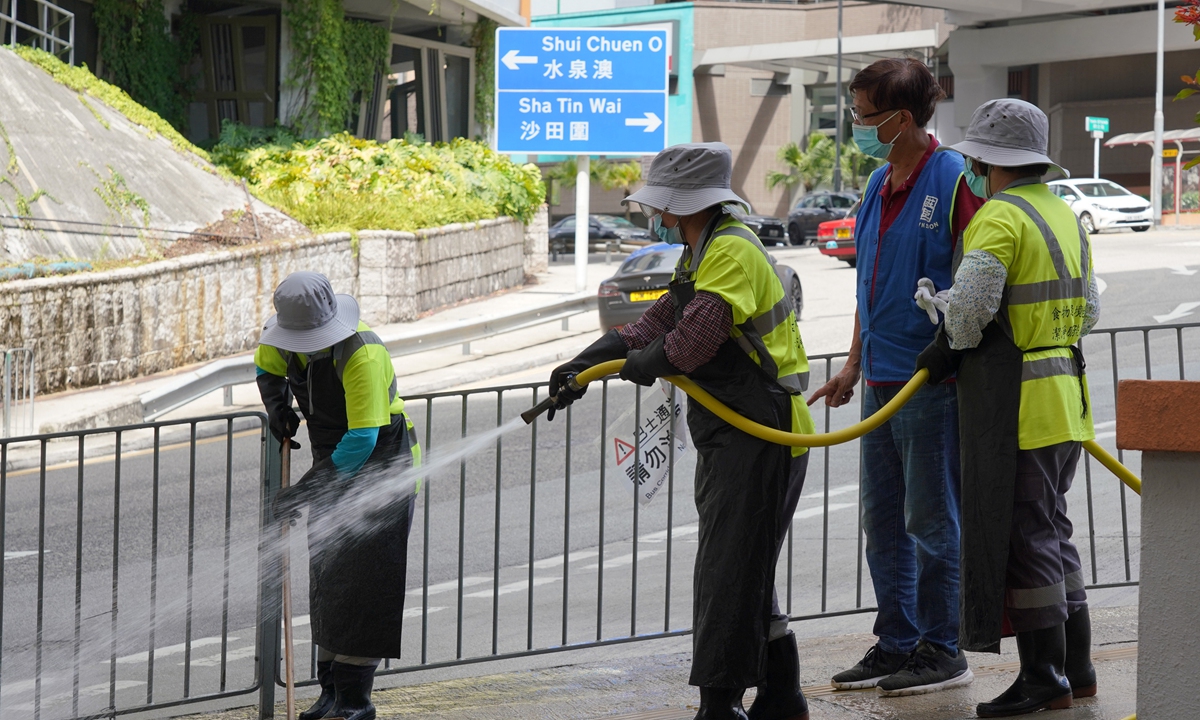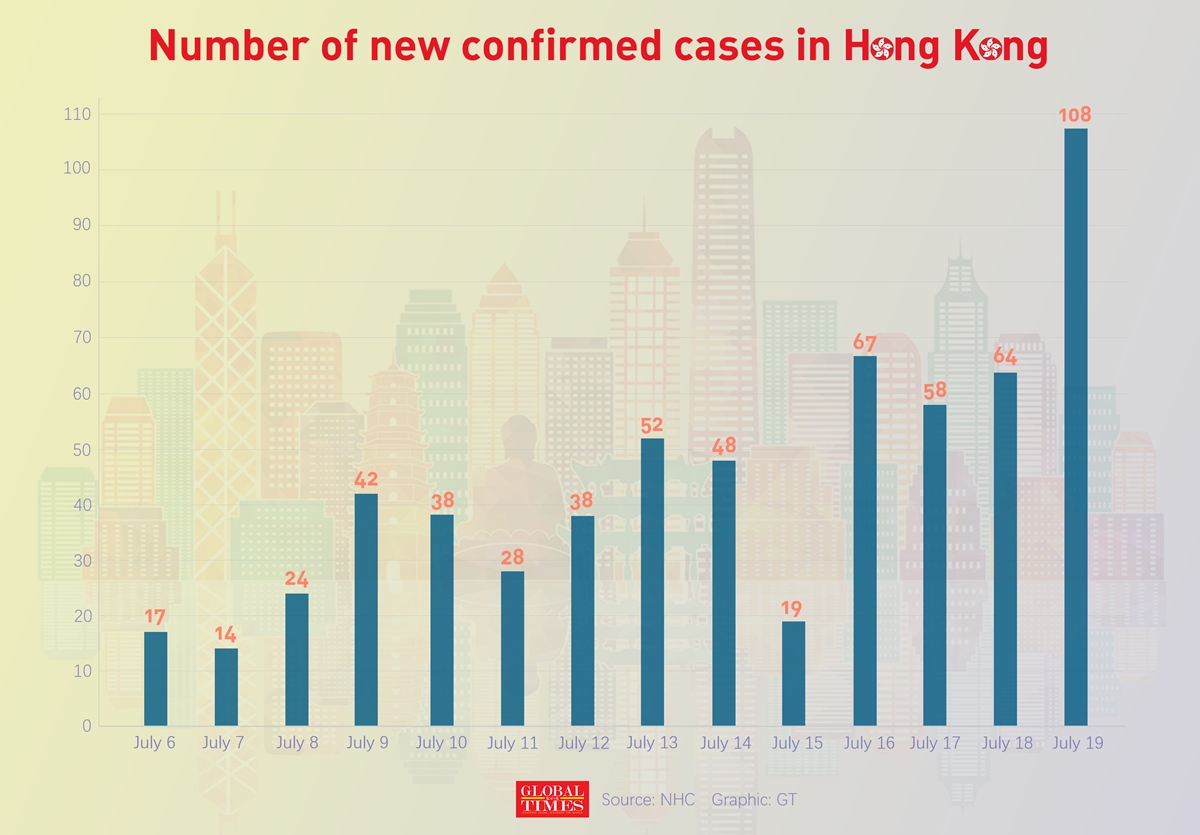HK reports record daily surge in COVID-19 cases, enforces strictest measures
By Leng Shumei and Liu Caiyu Source: Global Times Published: 2020/7/19 20:33:40

Cleaners spray disinfectant fluid to clean the street at Sha Tin, Hong Kong on Saturday. A spike in cases indicates the city has been hit by a third wave of COVID-19. On Sunday, Hong Kong reported 38 newly confirmed cases. Photo: cnsphoto
The Hong Kong Special Administrative Region (HKSAR) government on Sunday enhanced epidemic prevention and control measures, requiring residents to wear a mask in public, and some civil servants will work from home after the number of confirmed COVID-19 cases in the city exceeded that of SARS infections 17 years ago.
More than 100 new cases were reported in Hong Kong on Sunday, marking a new record in daily new cases in the city, Hong Kong Executive Chief Carrie Lam said at a press conference on Sunday.
The Department of Heath of Hong Kong said that between 4 pm on Saturday and midnight Sunday, a total of 108 new COVID-19 cases were reported in the city, with 83 being domestic cases and 25 imported cases.
Microbiologists believe that slack border testing and quarantine measures are to blame for the virus' resurgence in Hong Kong and suggested expanding testing for Hong Kong residents.
The number of confirmed COVID-19 cases in the city had reached 1,777 on Saturday, exceeding 1,755 SARS cases in 2003.
In response to the worsening epidemic, Lam announced that the regional government would only provide urgent and necessary services since July 20, and some civil servants would work from home.
The Hong Kong government on July 15 issued a seven-day ban on dining in at restaurants between 6 pm and 5 am. Lam on Sunday extended the ban by another seven days.
She also required Hong Kong residents to wear a mask in public transportation. She said she would call a meeting to revise regulations to expand the mask wearing requirement in public indoor places.
Lam warned that this outbreak is more serious and troublesome as most cases are local ones, and cover many different groups like elderly people and taxi drivers.
It is possible that the Hong Kong government would issue mobilization restrictions if the situation continues to worsen, Lam said.

Infographic: GT
Experts reached by the Global Times said that this wave of COVID-19 resurgence in Hong Kong was likely caused by a virus strain from Europe and the US since March.
The virus did not spread widely from March to June as there were strict anti-epidemic measures. While the measures started to relax in July, the virus spread rapidly and triggered the outbreak, Hong Kong microbiologist Yuen Kwok-yung told the Global Times.
Many people no longer wear a mask even on trains, buses, vans and taxis. Through public transportation, the virus goes to every district in the city, but especially to poorer and more crowded areas such as Wong Tai Sin, Tze Wan Shan and Sham Shui Po, and even the housing estate at Shatin, Yuen said.
Yuen noted the gap in border control and low level of testing in Hong Kong as two major problems for Hong Kong's current anti-epidemic measures.
"Some people are exempted from quarantine or testing due to essential services or other reasons…These exempted people can carry the virus into Hong Kong. These asymptomatic virus carriers most likely gave their virus to taxi drivers at the airport. The taxi drivers spread it among themselves and at eateries," Yuen said.
Yuen suggested strict border testing and quarantine without exemptions and adequate countermeasures against hazards at critical control points like eateries and public transportation.
He called for sufficient testing for Hong Kong residents with mild respiratory symptoms.
The number of daily COVID-19 tests conducted in the past two weeks in Hong Kong reached 10,000, Lam said.
The tests focus on some high infection risk groups in the Kowloon East district where more cases were reported, including elderly people, taxi drivers and eatery employees.
A total of 3,000 samples have been collected from 113 nursing homes for the elderly in Kowloon East, and the test results came back negative. Samples of 800 among 5,000 taxi drivers in Kowloon and New Territories districts have been collected, Lam said.
Some Chinese mainland experts suggest that Hong Kong learn from cities on the mainland, and compare the outbreak in Hong Kong with those in Beijing and Xinjiang.
Zhang Wenhong, a Shanghai-based infectious disease specialist, said on Sina Weibo on Saturday that Hong Kong's strategy is to control it at a low level, while Beijing and Urumqi's strategy was to eliminate cases.
In the short term, Hong Kong's strategy uses comparatively fewer medical resources, but, in a long run, it may bring about higher economic costs due to outbreak fluctuations, Zhang said.
Zhang added that the mainland's rapid and precise anti-epidemic strategy can ensure cities' recovery in 3-4 weeks after the outbreak, which is the best solution for China.
Posted in: HK/MACAO/TAIWAN,CHINA FOCUS